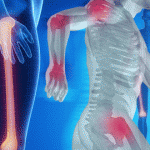NEW YORK (Reuters Health)—Medical cannabis reduces chronic pain patients’ opioid use, while improving their quality of life, according to a new survey of Michigan cannabis dispensary patrons. “They report that when they make that switch they overall feel better,” Dr. Daniel J. Clauw of the University of Michigan, Ann Arbor, told Reuters Health in a…
Mind-Body Therapy Helps Ease Chronic Low Back Pain
(Reuters Health)—Mind-based therapy programs may help ease chronic back pain, new research suggests. Patients who took part in such programs were more likely to have noticeable and lasting improvements in back pain than those who stuck to their usual routines, investigators found. Both of the approaches tested in the study—mindfulness-based stress reduction (MBSR) and cognitive…

Fibromyalgia & Bipolar Spectrum Disorder: A Shared Pathophysiology May Lead to Better Drug Targets
Patients suffering from fibromyalgia and those suffering from bipolar spectrum disorder experience similar symptoms. Research suggests that these diseases may share a pathophysiological process, particularly a similar impairment in the prefrontal-limbic networks of the brain. A new editorial addresses how a better understanding of the potential shared biological underpinning of these diseases could result in unique drug targets…
U.S. Agency Issues New Guidelines to Limit Chronic Use of Opioids
(Reuters)—Addressing a growing “epidemic” of opioid overdoses and abuse of the prescribed painkillers in the U.S., the Centers for Disease Control and Prevention on Tuesday released voluntary guidelines that instruct primary care doctors to sharply deter use of the medicines for chronic pain. “Overprescribing opioids, largely for chronic pain, is a key driver of America’s…

FDA Update: Infliximab Biosimilar Garners Support & Fibromyalgia Drug Receives Fast Track
Recently, an FDA committee announced support for the approval of CT-P13, an infliximab biosimilar. The FDA has also fast tracked the development of a fibromyalgia treatment designed for multiple symptoms…

Opioid Investigated to Treat Acute & Chronic OA Pain; Plus New RA Treatment & More
In Phase 2 trials, the oral opioid, CR845, has proved promising in treating pain in patients with hip and knee osteoarthritis. Olokizumab is being investigated to treat RA, and in Canada, adalimumab has been approved to treat polyarticular JIA in 2–4 year-olds…

Exercise Guidelines for Fibromyalgia Patients
Fibromyalgia syndrome (FMS) is a condition characterized by widespread pain, abnormal pain processing, sleep disturbance and fatigue. It is commonly associated with psychological distress and co-morbid conditions. Impaired cognition is common in individuals with FMS, and is often referred to as fibrofog.1 According to the U.S. Centers for Disease Control and Prevention, the prevalence of…

Intensive Program Relieves Symptoms of Juvenile Fibromyalgia
Pain can be reduced and functionality significantly improved for children with fibromyalgia without drug therapy, according to a study of 64 children in Philadelphia. Researchers combined intensive physical therapy and psychotherapy in individualized programs to treat the fibromyalgia patients…
Online Tools Can Help Manage Pain
(Reuters Health)—People with chronic pain may be able to use online tools to manage their symptoms, lessening the need for frequent doctor visits, an Australian study suggests. Researchers tested a series of web-based pain management tutorials on a group of adults who had been suffering symptoms for more than six months. Regardless of how much…
Rheumatology Coding Corner Question: Trigger-Point Injections for Fibromyalgia
A 65-year-old established female patient returns to the office for a follow-up visit for her diagnosis of fibromyalgia. She complains of pain, stiffness and swelling in her left hand, elbow and neck that is persistent since her last visit. The pain is considerably worse in the morning. She denies any fevers, cough or dyspnea. The…
- « Previous Page
- 1
- …
- 6
- 7
- 8
- 9
- 10
- …
- 13
- Next Page »